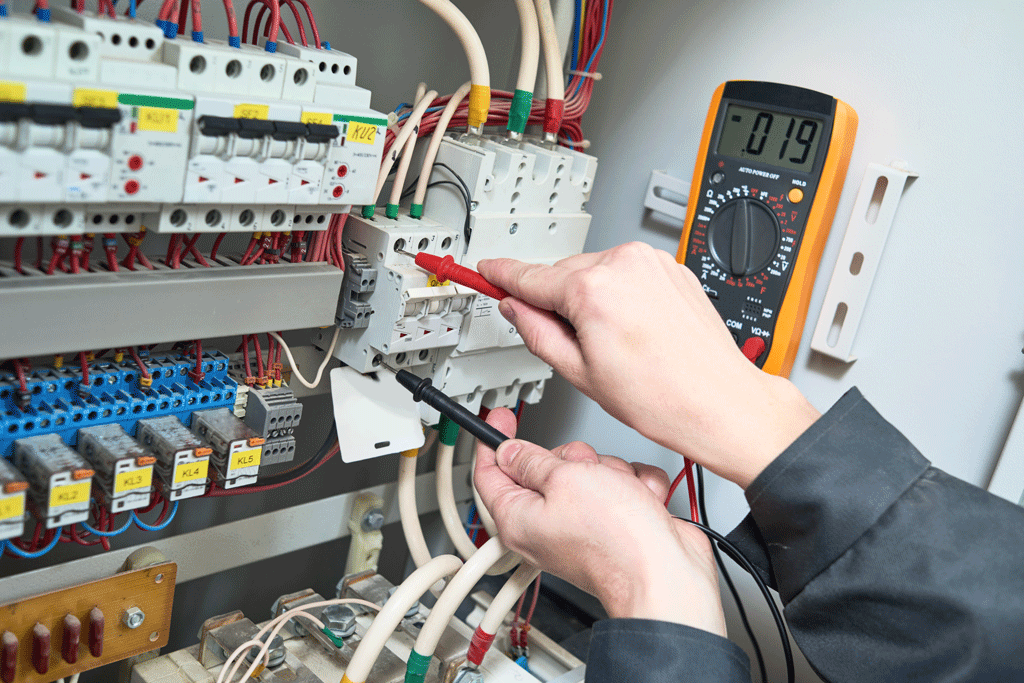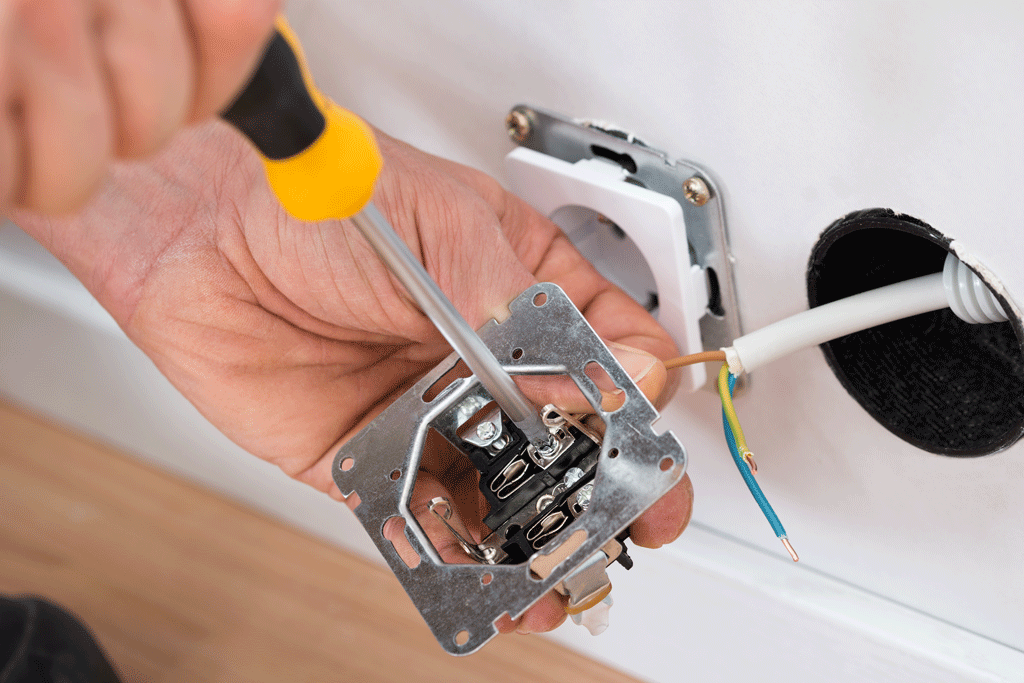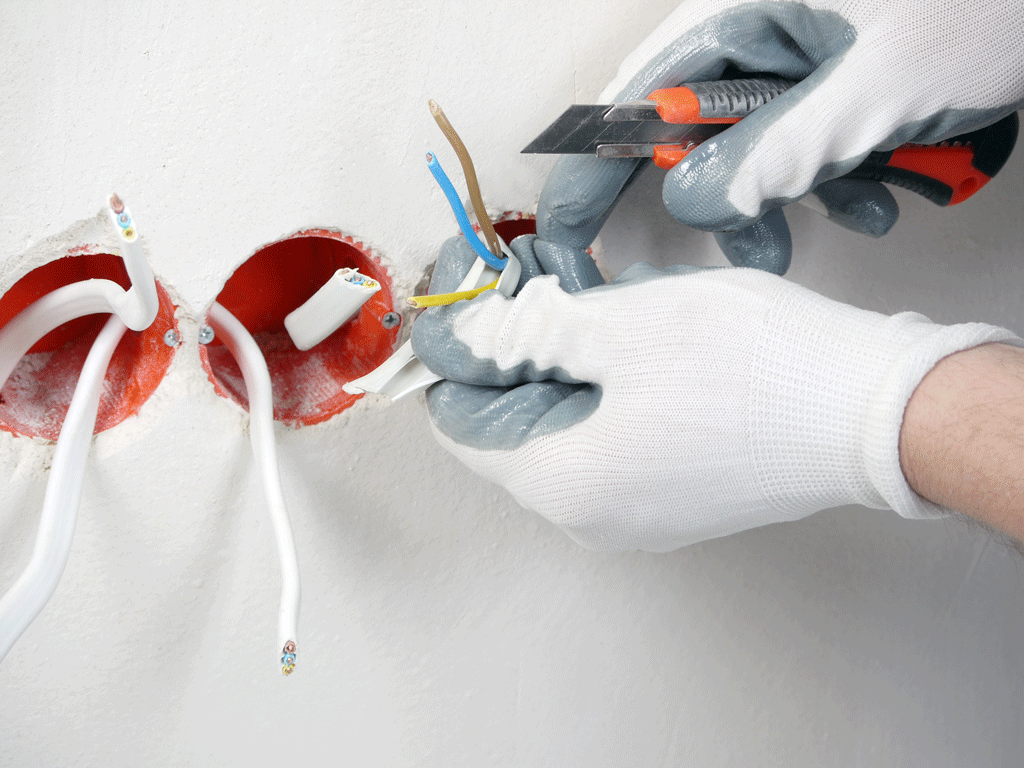Ever wondered why your lights flicker more often than they should, or why some outlets just stop working?
You’re not alone.
Electrical issues are a common headache for homeowners like you, but they’re more than just an inconvenience – they can pose serious safety risks.
In this article, we’re going to explore the intricate world of electrical repairs. Whether you’re a DIY enthusiast or someone who prefers professional help, this guide is packed with everything you need to know about keeping your home’s electrical system in top shape.
Also read: 4 Electrical Upgrades That Can Increase Your Home’s Value
What is Electrical Repairs?
Electrical repairs involve the process of diagnosing and fixing issues within an electrical system. This encompasses a wide range of tasks, from simple fixes like replacing a faulty light switch to more intricate and complex challenges such as correcting a home’s entire wiring system.
The primary objective of these repairs is not only to restore functionality but also to ensure the safety and efficiency of the electrical system in your home or business.
The scope of electrical repairs can vary greatly. It might involve something as straightforward as changing a blown fuse or as complicated as troubleshooting and repairing a malfunctioning electrical appliance.
In residential settings, this could include addressing issues with indoor and outdoor lighting, repairing electrical outlets, or updating old wiring that poses a fire hazard.
In commercial settings, electrical repairs might involve fixing power generators, maintaining HVAC systems, or ensuring that the electrical components of machinery are functioning correctly.
Accurate diagnosis is a critical aspect of electrical repairs. Misdiagnosing an electrical issue can not only lead to ineffective repairs but can also exacerbate the existing problem.
For instance, if a circuit breaker frequently trips, the issue might seem to be with the breaker itself.
However, a professional electrician might uncover that the real problem lies with an overloaded circuit or a fault in the wiring. This level of diagnostic precision is crucial for effective and safe repairs.
Safety is a paramount concern in electrical repairs. Incorrect handling of electrical components can lead to severe injuries or property damage. Therefore, it’s essential to adhere to safety protocols and local electrical codes.
This is where professional electricians play a vital role. They bring not only their expertise but also a commitment to compliance with safety standards and building regulations.
Preventative maintenance is an integral part of electrical repairs. Regular inspections and maintenance work can identify potential issues before they escalate into major problems. This includes checking for loose connections, inspecting the condition of wires and cables, and ensuring that all components of the electrical system are functioning optimally.
Preventative maintenance not only enhances the safety of the electrical system but also contributes to its efficiency and longevity.
Electrical repairs are a critical aspect of maintaining the safety and functionality of any building’s electrical system.
Whether it’s a minor repair or a major overhaul, understanding the importance and complexity of these tasks is essential for every homeowner and business operator. With the right approach and professional assistance, you can ensure that your electrical systems are not just operational but also safe and efficient.
Understanding the Basics of Electrical Repairs
Electrical repairs are essential for maintaining the safety and functionality of your home’s electrical system.
They involve a range of tasks, from simple fixes to complex rewiring projects. Let’s delve deeper into what this entails.
Identifying Common Electrical Issues
At the heart of electrical repair work is the ability to identify and resolve issues that hinder the proper functioning of your electrical system. These problems can range from the apparent, like a non-functioning outlet or a flickering light, to more subtle signs that are often overlooked.
For instance, an unusually high electricity bill could be a telltale sign of an underlying electrical issue, such as a power leak or an overburdened system.
The Role of Circuit Breakers and Fuses
A significant aspect of electrical repairs involves dealing with circuit breakers and fuses. These components are designed to protect your home from electrical overloads and short circuits.
When a circuit breaker trips or a fuse blows, it’s a clear indication that there’s an issue within the electrical circuit. Understanding how to safely reset a breaker or replace a fuse is a basic yet crucial skill.
However, if these issues occur frequently, it’s a sign that you need a more comprehensive electrical repair.
Wiring and Connectivity
Another key area of electrical repairs is addressing wiring and connectivity issues. Over time, wires can become frayed, loose, or outdated, leading to potential hazards.
Ensuring that all connections are secure and that the wiring is up to current standards is vital for both safety and efficiency. This is especially important in older homes, where outdated wiring might not only be inefficient but also pose a significant fire risk.
Upgrading Electrical Components
Part of maintaining a modern and safe electrical system involves upgrading components that are no longer fit for purpose.
This could mean replacing old outlets with new, grounded ones, installing GFCI (Ground Fault Circuit Interrupter) outlets in areas prone to moisture, or even upgrading the entire electrical panel to accommodate more modern electrical demands.
These upgrades not only improve safety but also enhance the overall functionality of your electrical system.
The Importance of Professional Expertise
While some minor electrical repairs can be a DIY project, most require the expertise of a professional electrician.
Complex tasks like rewiring, or upgrading an electrical panel, should not be attempted without the necessary skills and knowledge.
Professional electricians bring not only their expertise but also ensure that all repairs comply with local electrical codes and safety standards.
Preventative Maintenance
Lastly, preventative maintenance plays a crucial role in electrical repairs. Regular inspections can help identify potential issues before they become major problems.
This includes checking for any signs of wear and tear, ensuring that all connections are tight, and verifying that the system as a whole is operating efficiently. Preventative maintenance is key to avoiding unexpected breakdowns and costly repairs.
Understanding the basics of electrical repairs, from identifying common issues to knowing when to call in a professional, is crucial for any homeowner.
Regular maintenance and timely upgrades can go a long way in ensuring the safety and efficiency of your home’s electrical system.
Also read: Common Electrical Mistakes That Homeowners Make
Common Types of Electrical Repairs
Electrical repairs are a crucial aspect of maintaining a safe and efficient home.
Understanding the common types of repairs can help you identify and address issues promptly. Here’s a breakdown of typical electrical repair tasks.
Fixing Wiring Issues
One of the most critical types of electrical repairs involves addressing wiring problems. This includes dealing with frayed or outdated wiring, which can pose significant fire hazards.
In older homes, wiring may not only be deteriorating but also insufficient for modern electrical demands. Upgrading wiring is not just about safety; it’s also about ensuring your electrical system can handle today’s appliances and technology efficiently.
Circuit Breaker Repairs
Circuit breakers are essential for the safe distribution of electricity throughout your home. They are designed to trip and shut off power when they detect an overload or short circuit, preventing damage and potential fires.
However, when circuit breakers frequently trip or fail to reset, it indicates a deeper issue within your electrical system.
Repairing or replacing faulty circuit breakers is crucial for maintaining the safety and functionality of your home’s electrical infrastructure.
Outlet and Switch Repairs
Outlets and switches are the most interacted-with components of your home’s electrical system.
Over time, they can become loose, worn out, or outdated, necessitating repairs or replacements.
Loose outlets can be a fire hazard, while outdated ones may not accommodate newer, grounded plugs. Repairing or upgrading these components is essential for both safety and convenience.
Light Fixture Repairs
Light fixtures are another common focus of the repairs. Issues can range from flickering lights, which might indicate a loose connection, to completely non-functional fixtures.
Upgrading to more energy-efficient lighting, like LED fixtures, not only resolves these issues but also reduces your home’s energy consumption, making this a financially and environmentally beneficial repair.
Electrical Panel Upgrades
The electrical panel, often referred to as the breaker box, is the heart of your home’s electrical system.
Older panels may not be equipped to handle the electrical load of modern households, leading to frequent tripping breakers and potential safety risks. Upgrading your electrical panel is a significant repair that not only enhances the safety of your home but also its overall electrical capacity, ensuring it can support all your appliances and technological needs.
Understanding these common types of electrical repairs is crucial for any homeowner.
Regularly checking and maintaining these aspects of your electrical system can prevent major issues and ensure your home remains a safe and comfortable environment.

Photo By Dmitry Kalinovsky at Shutterstock
The Importance of Professional Diagnosis in Electrical Repairs
When it comes to electrical repairs, accurately diagnosing problems is crucial for effective and safe solutions.
This task often requires a level of expertise and experience that only professional electricians can provide. Let’s explore why professional diagnosis is essential in electrical repairs.
Expert Identification of Electrical Issues
A professional electrician brings a depth of knowledge that is vital for correctly identifying electrical problems.
What might seem like a minor issue, such as a malfunctioning outlet, could actually be a symptom of a more significant problem within your home’s electrical system.
Professionals use their training and experience to look beyond the surface, ensuring that the true root cause of an issue is addressed. This expertise is crucial for preventing recurring problems and potential hazards.
Understanding Complex Electrical Systems
Modern electrical systems can be complex, with interconnected components that all need to function harmoniously.
A professional electrician understands these complexities and can navigate through various system configurations.
This understanding is particularly important in older homes where the electrical system might have been modified over the years, sometimes without proper documentation or adherence to current safety standards.
Accurate and Safe Solutions
Electrical repairs can be dangerous if not handled correctly.
A professional diagnosis ensures that the repair process is conducted safely, adhering to all relevant safety codes and regulations.
Electricians are trained to handle electrical components safely, reducing the risk of accidents such as electrical shocks or fires. They also ensure that the repairs they perform are in compliance with local building codes, which is crucial for both safety and legal reasons.
Preventing Future Problems
By accurately diagnosing and fixing electrical issues, professional electricians help prevent future problems. This proactive approach can save homeowners time and money in the long run.
For example, identifying and rectifying a minor wiring issue can prevent a major electrical failure down the line, avoiding costly and extensive repairs.
The Role of Advanced Diagnostic Tools
Professional electricians have access to advanced diagnostic tools and technology that allow for more precise problem identification. These tools can detect issues that are not immediately visible, such as hidden wiring problems or potential points of electrical failure.
This technology, combined with a professional’s expertise, ensures a thorough and accurate diagnosis.
The importance of professional diagnosis in electrical repairs cannot be overstated. It ensures that electrical issues are accurately identified and safely resolved, adhering to the highest standards of safety and efficiency.
For homeowners, this means peace of mind knowing that their electrical system is in capable hands.
Safety and Compliance in Electrical Repairs
When it comes to electrical repairs, prioritizing safety and adhering to compliance standards is non-negotiable.
The risks associated with mishandling electrical components are significant, ranging from serious injuries to fatalities.
Let’s delve into why safety and compliance are critical in the realm of electrical repairs.
Prioritizing Safety in Electrical Work
The foremost concern in any electrical repair task is safety. Electricity is inherently dangerous, and incorrect handling of electrical components can lead to severe consequences, including electrical shocks, burns, and even life-threatening situations.
Professional electricians are trained to handle these risks appropriately. They follow stringent safety protocols to ensure that all repair work is carried out without endangering themselves or the occupants of the building.
This includes wearing the right protective gear, using insulated tools, and following established procedures for diagnosing and repairing electrical faults.
Compliance with Local Building Codes
Electrical repairs are not just about fixing a problem; they must also comply with local building codes and regulations. These codes are in place to ensure that all electrical work meets the required safety standards, thereby reducing the risk of electrical fires and other hazards.
Professional electricians are well-versed in these codes and ensure that all repairs and installations they perform are compliant.
This is crucial not only for safety but also for legal reasons, as non-compliance can lead to penalties and legal issues, especially in the event of an accident.
Adhering to Safety Standards
There are various safety standards and best practices in the field of electrical work. These standards are designed to ensure that all electrical systems and repairs are safe and reliable.
Professional electricians are required to stay updated with these standards, which often evolve to incorporate new technologies and safety research findings.
By adhering to these standards, electricians ensure that the electrical systems they work on are not only functional but also safe for long-term use.
Regular Training and Certification
To maintain a high level of safety and compliance, professional electricians undergo regular training and certification.
This ongoing education ensures that they are up-to-date with the latest safety practices, tools, and technologies in the electrical industry. It also reinforces their understanding of the local building codes and standards, enabling them to provide services that meet the current regulatory requirements.
Safety and compliance are the cornerstones of effective and responsible electrical repairs. By entrusting electrical work to professional electricians, homeowners and businesses can ensure that their electrical systems are repaired safely and in accordance with the highest standards of the industry.
This not only protects the property but also ensures the safety and well-being of all individuals involved.

Photo By Andrey_Popov at Shutterstock
The Role of Preventative Maintenance in Electrical Repairs
Preventative maintenance is a crucial aspect of managing and sustaining a healthy electrical system.
Regularly scheduled maintenance and inspections can preemptively identify and resolve potential issues, averting major problems and ensuring the system’s safety, efficiency, and longevity.
Let’s explore the various facets of preventative maintenance in electrical repairs.
Regular Inspections for Early Detection
The first step in preventative maintenance is conducting regular inspections. These inspections are vital in spotting early signs of wear and tear or damage that could escalate into more significant issues if left unaddressed.
During these inspections, a professional electrician will check for loose connections, signs of overheating, wear in wires and cables, and any other irregularities.
Early detection of such issues can prevent costly repairs and potential hazards in the future.
Maintaining Optimal System Performance
Preventative maintenance goes beyond just fixing immediate problems; it’s about ensuring that all components of the electrical system are functioning at their best. This includes testing and calibrating equipment to ensure optimal performance.
Regular maintenance helps in maintaining the efficiency of the electrical system, which can lead to reduced energy costs and improved system reliability.
Updating and Upgrading Components
Part of preventative maintenance involves updating and upgrading electrical components as needed. This could mean replacing outdated or inefficient parts with newer, more efficient ones.
Upgrades are especially important in older systems to meet current safety standards and to cope with the increasing electrical demands of modern appliances and devices.
Safety Enhancements
Safety is a paramount concern in electrical systems. Preventative maintenance includes regular checks to ensure all safety features are functioning correctly.
This includes testing ground fault circuit interrupters (GFCIs), ensuring proper earthing of electrical systems, and verifying that safety switches are operational. These measures are essential to protect against electrical shocks and fires.
Extending the Lifespan of Electrical Systems
Regular preventative maintenance can significantly extend the lifespan of an electrical system.
By keeping all components in good working order and addressing issues promptly, the overall strain on the system is reduced. This not only prevents breakdowns but also ensures that the system continues to function effectively for a longer period, providing better value for the investment.
Documentation and Record Keeping
An often-overlooked aspect of preventative maintenance is documentation and record-keeping. Keeping detailed records of inspections, repairs, and replacements can be invaluable, especially when diagnosing future problems or planning upgrades.
It provides a clear history of the system’s condition and maintenance, which is beneficial for both homeowners and professional electricians.
The role of preventative maintenance in electrical repairs is multifaceted and vital. It encompasses regular inspections, performance maintenance, component upgrades, safety checks, and record-keeping.
By investing in preventative maintenance, homeowners can ensure their electrical systems are safe, efficient, and durable, ultimately saving time, money, and potential headaches in the long run.
DIY vs Professional Approach in Electrical Repairs
Navigating electrical repairs can often boil down to a choice between a DIY approach and seeking professional help. Understanding the scope, risks, and requirements of electrical work is crucial in making this decision.
Here’s a detailed look at both approaches, helping you decide the best course of action for various electrical repair scenarios.
When to Consider DIY Electrical Repairs
Simple Fixes: Tasks like replacing light bulbs, installing simple light fixtures, or changing switch plates are generally safe for DIY. These require basic tools and minimal electrical knowledge.
Safety Precautions: For any DIY electrical work, safety is paramount. Always turn off the power at the circuit breaker and use insulated tools. If you’re not confident or knowledgeable about the task, it’s better to seek professional help.
Educational Resources: Utilize reliable resources to guide you through simple repairs. Online tutorials, DIY books, and hardware store guides can be helpful. However, ensure the information is from a credible source.
Limitations of DIY: Understand the limitations of your skills and the risks involved. DIY is not advisable for complex tasks like wiring, major installations, or anything involving the main electrical panel.
When to Call a Professional Electrician
Complex Repairs and Installations: Jobs like rewiring, dealing with circuit breakers, installing new outlets, or any work that requires an understanding of electrical codes should be left to professionals.
Safety and Compliance: Professional electricians are trained to handle complex electrical issues safely and in compliance with local building codes and regulations. This is crucial for preventing potential hazards and ensuring your work is legally compliant.
Troubleshooting Expertise: Electricians can diagnose and resolve issues that might not be apparent to the untrained eye. Their expertise is invaluable in preventing recurring problems and ensuring the longevity of your electrical system.
Cost-Effectiveness: While hiring a professional might seem more expensive, it can be more cost-effective in the long run. Incorrect DIY repairs can lead to further damage, resulting in higher costs.
Regular Maintenance: A Joint Effort
Homeowner’s Role: Regularly check for signs of wear and tear, such as loose outlets, flickering lights, or unusual sounds from the electrical panel. These can often be early indicators of bigger issues.
Professional Inspections: Schedule periodic inspections by a licensed electrician. They can identify potential problems, ensure everything is up to code, and advise on any necessary repairs or upgrades.
Upgrading Your System: For older homes or systems showing signs of strain under modern electrical loads, professional assessment and upgrades are essential to maintain safety and efficiency.
Deciding between a DIY and professional approach in electrical repairs depends on the complexity of the task, safety considerations, and your own skill level.
While simple tasks can often be handled personally, complex or risky repairs should always be entrusted to a professional. Regular maintenance, combining both DIY checks and professional inspections, is key to a safe and efficient electrical system.
How to Maintain Your Electrical System for Long-Term Safety and Efficiency
Maintaining your electrical system is crucial for ensuring long-term safety and efficiency in your home.
Regular maintenance can prevent serious issues, reduce the risk of electrical fires, and ensure your system operates at its best. Here’s a comprehensive guide on maintaining your electrical system effectively.
Regular Inspections and Safety Checks
Routine Inspections: Schedule professional inspections of your electrical system every few years. An electrician can identify potential issues that may not be visible to the untrained eye.
Safety Audits: Conduct regular safety audits to check for any visible signs of wear and tear, such as frayed wires, loose connections, or overheating appliances.
Test Safety Devices: Regularly test safety devices like circuit breakers, GFCIs (Ground Fault Circuit Interrupters), and smoke detectors to ensure they are functioning correctly.
Preventative Maintenance Strategies
Check for Overloads: Be aware of the signs of overloaded circuits, such as flickering lights or tripping breakers, and address them promptly to prevent damage.
Secure Loose Connections: Loose electrical connections can lead to overheating and fires. Tighten any loose connections and replace damaged outlets or switches.
Update Old Wiring: If your home is old, consider updating the wiring. Older wiring systems may not be equipped to handle modern electrical loads and can be a fire hazard.
Energy Efficiency Practices
Energy-Efficient Appliances: Use energy-efficient appliances to reduce the strain on your electrical system and lower your energy bills.
LED Lighting: Replace traditional incandescent bulbs with LED bulbs, which are more energy-efficient and have a longer lifespan.
Smart Home Devices: Consider installing smart home devices like thermostats and lighting systems that can help manage energy usage more effectively.
Dealing with Common Electrical Issues
Address Minor Issues Promptly: Don’t ignore minor issues like a flickering light or a buzzing switch. These can be early signs of larger problems.
Understand Your Electrical Panel: Familiarize yourself with your home’s electrical panel. Knowing how to safely reset a tripped breaker can be crucial in preventing damage.
Avoid DIY on Complex Tasks: For complex issues, always seek professional help. DIY solutions can often lead to bigger problems and safety risks.
Educating Yourself and Your Family
Learn Basic Electrical Safety: Educate yourself and your family on basic electrical safety practices to prevent accidents.
Stay Informed: Keep up with the latest safety standards and energy-efficient practices to ensure your system remains up-to-date.
Maintaining your electrical system for long-term safety and efficiency requires a combination of professional inspections, preventative maintenance, energy efficiency practices, and a proactive approach to dealing with common issues.
Regular maintenance not only ensures the safety of your home but also contributes to its overall energy efficiency, making it a wise investment for any homeowner.

Photo By Fauzi Muda at Shutterstock
Top 5 Tested and Proven Strategies for Safe and Efficient Electrical Repairs
Electrical repairs, whether done professionally or as a DIY project, require careful planning and adherence to safety protocols.
Here are the top five strategies to ensure your repairs are both safe and effective.
1. Understanding Your Home’s Electrical Load
Importance of Load Knowledge: Before embarking on any electrical repair, it’s crucial to understand your home’s electrical load. This involves knowing the total energy required to operate all your appliances and devices.
Calculating Electrical Load: Each appliance contributes to the total load, and exceeding this capacity can lead to circuit overloads and potential hazards.
Learning to calculate your home’s electrical load helps in planning upgrades or new installations, ensuring that your electrical system can handle the demand.
2. Utilizing the Right Tools
Tool Selection: The right tools are essential for safe and effective electrical repairs. Using inappropriate tools not only compromises the repair quality but also increases the risk of accidents.
Essential Tools: A well-equipped toolbox should include insulated screwdrivers, pliers, wire cutters, and voltage testers. These tools should be specifically designed for electrical work to ensure safety and precision.
3. Prioritizing Safety Gear
Safety Equipment: When working with electricity, personal protective equipment (PPE) is non-negotiable. This includes insulated gloves, hard hats, safety goggles, face shields, safety shoes, and flame-resistant clothing.
Preventing Accidents: Proper safety gear minimizes the risk of electrical shocks, burns, and other injuries. It’s a fundamental aspect of electrical repair work, crucial for both DIYers and professionals.
4. Insulation of Tools
Insulated Tools: Tools used in electrical repairs must be well-insulated. This is particularly important when working with live circuits or near energized components.
Protection and Calibration: Insulated tools not only protect against electric shocks but also prevent damage to sensitive electrical components. They should be regularly inspected for wear and calibrated for specific electrical loads.
5. Ensuring Proper Grounding
Grounding Your Electrical System: A well-grounded electrical system is essential for safety. It provides a path of least resistance for electrical current, reducing the risk of electrocution.
Professional Assessment: If you’re unsure about the grounding status of your home, it’s wise to consult a professional. Proper grounding is a critical safety feature that should be verified before undertaking any repairs.
Adhering to these five strategies is crucial for anyone undertaking repairs. They ensure not only the success of the repair work but also the safety of everyone involved.
Whether you’re a seasoned electrician or a homeowner looking to fix a minor issue, remember that safety and proper preparation are key to successful electrical repairs.
Gardner Electrical: Your Go-To for Expert Electrical Repairs
Gardner Electrical has established itself as a leading provider of electrical repairs, known for its reliability, professionalism, and high customer satisfaction.
With an impressive 4.9-star rating from 190 reviews, they are a trusted choice for homeowners and businesses alike. Let’s delve deeper into what makes Gardner Electrical stand out in the field of electrical repairs.
Wide-Ranging Service Areas
Gardner Electrical’s services extend across multiple locations, ensuring accessible and quality electrical repair solutions.
They cater to a diverse range of areas including Crandall, TX, Forney, TX, Gun Barrel City, TX, Heath, TX, Kaufman, TX, Kemp, TX, Mabank TX, Mesquite, TX, RockWall, TX, Sunnyvale, TX, and Terrell, TX.
This extensive service reach demonstrates their commitment to providing comprehensive electrical solutions to a broad customer base.
Diverse Electrical Repair and Installation Services
Gardner Electrical offers a wide array of services covering all aspects of electrical repairs and installations.
Their team of licensed electricians is adept at handling various tasks, from routine maintenance checks to complex emergency repairs.
They specialize in electrical panel work, installation of 220v lines for appliances like hot tubs, and complete electrical system installations for new builds or remodels. Their expertise ensures that every job, big or small, is executed with the highest standards of quality and safety.
Commitment to Customer Satisfaction
The high customer satisfaction rate of Gardner Electrical is a testament to their dedication to excellent service.
Clients consistently praise their reasonable pricing, swift service delivery, and the professionalism of their technicians. Gardner Electrical focuses on building lasting relationships with clients, emphasizing trust, quality, and reliability in their work.
This customer-centric approach is evident in their glowing reviews and repeat business.
Easy Accessibility and Reliable Support
For those in need of expert repairs, Gardner Electrical is readily accessible. You can contact them at 214-807-0210 for inquiries or to schedule a service.
Their commitment to excellence and customer satisfaction is evident in every interaction, making them a preferred choice for all electrical repair needs.
Why Choose Gardner Electrical
Gardner Electrical’s reputation for quality service and customer satisfaction makes them an ideal choice for anyone seeking dependable electrical repairs.
Their extensive service area, comprehensive range of solutions, and customer-focused approach ensure that your electrical needs are in capable hands. Their team’s expertise in electrical repairs, combined with their commitment to safety and efficiency, makes them a standout provider in the industry.
Check out their reviews and ratings to understand why they are highly recommended in the community.
With Gardner Electrical, you can rest assured that your electrical systems are serviced by professionals who are not only skilled but also deeply committed to ensuring customer satisfaction and safety.
Conclusion
Navigating the complexities of electrical repairs requires a blend of knowledge, caution, and the right approach.
Whether you’re a DIY enthusiast tackling minor fixes or a homeowner relying on professional services, understanding the nuances of electrical repairs is crucial.
From recognizing the importance of knowing your home’s electrical load to the necessity of using the right tools and safety gear, each aspect plays a pivotal role in ensuring safe and efficient repair work.
Remember, electrical repairs are not just about fixing immediate problems; they’re about ensuring long-term safety and efficiency of your home’s electrical system. Regular inspections, preventative maintenance, and staying informed about safety standards are key to avoiding potential hazards.
Moreover, services like Gardner Electrical offer professional expertise and reliability, ensuring that your electrical needs are met with the highest standards of quality and safety.
As we’ve explored, the right balance between DIY efforts and professional intervention is essential.
While some tasks can be safely managed at home, complex or risky repairs should always be entrusted to experienced professionals.
By following these guidelines and understanding when to seek expert help, you can ensure that your home’s electrical system remains a safe, efficient, and reliable part of your daily life.

Photo By WHYFRAME at Shutterstock
FAQs
1.What are the most common signs that I need electrical repairs in my home?
Common signs include frequent circuit breaker trips, flickering or dimming lights, buzzing sounds from outlets or switches, and outlets that are hot to the touch. These symptoms can indicate overloaded circuits, poor wiring, or failing electrical components.
2.How often should I have my home’s electrical system inspected?
It’s recommended to have a professional inspection at least every 10 years for an average home, and every 5 years for homes over 25 years old. Regular inspections can identify potential issues before they become serious problems.
3.Can I perform electrical repairs myself?
Simple tasks like replacing a light bulb or a switch plate can be done DIY. However, more complex repairs involving wiring, circuit breakers, or electrical panels should always be handled by a licensed electrician for safety and compliance reasons.
4.What should I do if my circuit breaker keeps tripping?
If a circuit breaker trips frequently, it could indicate an overloaded circuit or a fault in the electrical system. It’s best to consult a professional electrician to diagnose and fix the issue safely.
5.Is it necessary to upgrade my home’s electrical panel?
If your home is older or you’re adding significant new electrical loads (like major appliances), an upgrade might be necessary to handle the increased demand and enhance safety.
6.What are the risks of outdated electrical wiring in my home?
Outdated wiring can lead to inefficiencies, potential fire hazards, and the inability to support modern appliances. It’s important to have outdated wiring assessed and replaced by a professional.
7.How can I tell if my home is properly grounded?
A professional electrician can assess your grounding system. Proper grounding is crucial for safety, as it helps direct electrical current away from people in case of a fault.
8.What safety gear should I use for DIY electrical repairs?
For any DIY electrical work, use insulated gloves, safety goggles, and ensure all tools are insulated. Always turn off the main power before starting any repair.
9.How can I improve the energy efficiency of my home’s electrical system?
Use energy-efficient appliances, LED lighting, and consider smart home devices to manage energy usage. Regular maintenance also ensures your system is running efficiently.
10.When should I call a professional for electrical repairs?
Call a professional for complex issues like wiring problems, panel upgrades, or if you’re unsure about the safety of a DIY repair. Professional expertise ensures safety and compliance with electrical codes.
See our most recent blog on this topic here.
Check out our reviews here
Photo By pryzmat at Shutterstock
Randall Gardner









